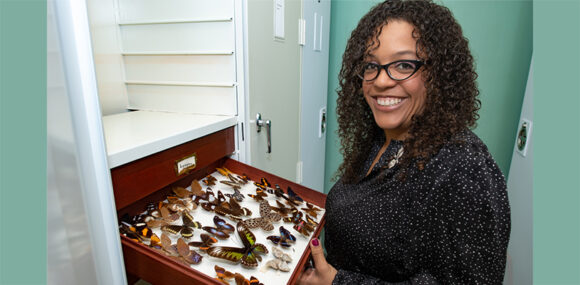
Jessica Ware. Photo by ©AMNH/D. Finnin.
Alumni Profile
As a freshman at the University of British Columbia, Jessica Ware envisioned a career as a marine biologist. But in an invertebrate zoology class, she was stunned to learn there are more species of insects than any other animal on the planet. About a million insect species have been identified but several million more may exist. What’s more, insects make up probably about 90 percent of all animal life, Ware GSNB’08 learned.
“There’s something like 10 quintillion individual insects [alive] at any given time,” Ware says. (That’s 10 with 18 zeroes after it.) “We think mammals and birds are so abundant but actually they are relatively rare compared with insects.” The immensity and diversity of the insect world—and the prospect of possibly identifying a new species—captivated Ware and led her to change her major to entomology, the study of insects.
“I liked the idea that I could contribute something that was new, that had never been done or found before,” she adds. “That seemed very exciting to me.” She also liked the idea that insects can be studied just about anywhere, anytime—unlike mammals or other vertebrates, which can be more elusive.
Now, Ware shares her enthusiasm for insects as associate curator of invertebrate zoology at the American Museum of Natural History in New York City and on shows like PBS’s Nova and Neil deGrasse Tyson’s StarTalk podcast. She’s also president of the Entomological Society of America, the largest insect organization in the world.
As a curator, Ware studies insect evolution, genetics, and morphology (their internal and external anatomy). By looking at an insect’s morphology and genetics, she says, “You can reconstruct phylogenetic trees, which are kind of like family trees. Those help us understand which species are related to which.” She’s using that information to study the health of insect species and determine which are declining because of climate change, habitat loss, and pesticide use.
But why, if there are so many six-legged critters, should the rest of us care about them as much as Ware does?
Food for thought
First, insects—and not just butterflies and bees—are major pollinators of many food crops. They are also destroyers, but in a good way: termites and other insects break down dead wood and vegetation in the forest, allowing new growth to occur. What’s more, insects are a primary food source for birds and mammals. “A significant number of bird species would go extinct without insects,” Ware says. “Once you lose some of those birds, that would affect the animals that eat the birds. It would be catastrophic.”
Insects also hold tremendous promise as a sustainable food source for humans, requiring fewer resources to produce than do other sources of protein, Ware says. Eating insects, or entomophagy, “is the wave of the future. For most people in cultures outside of America, eating insects is a regular occurrence,” she says, adding that she regularly enjoys insect cuisine when she’s out in the field in, say, Costa Rica or Australia or Namibia.
Traveling the world is one of Ware’s favorite perks of being an entomologist. She’s studied insects on every continent except Antarctica. Her travels to Fiji led to her discovery of Neotermes gnathoferrum, a termite that eats mahogany. “Mahogany’s a really hard wood,” Ware says, “so its name means ‘iron jawed.’”
Another insect species is actually named for Ware. Before she began working at the natural history museum in 2020, she taught biology at Rutgers University–Newark, and one of her graduate students named a new cockroach he found in Guyana after her, Dasyblatta warei. “It means the cockroach with curly hair,” Ware says. “I was very honored!”
Damsels, dragons, and Scarlet Knights
Ware is internationally known for her expertise in dragonflies and their relatives the damselflies, and was, until recently, president of the Worldwide Dragonfly Association. She loves not only the beauty and grace of dragon- and damselflies but also the fact that they likely were the first creatures to take to the skies about 300 million years ago, “before birds, before bats, before pterosaurs,” she says.
Ware credits her own evolution to her early years at Rutgers University–New Brunswick’s Cook College (now the School of Environmental and Biological Sciences). She says her time as a doctoral student there was an invaluable foundation for her position at the museum. Faculty and students from disparate Cook departments were “working toward this common goal, figuring out evolution, harnessing knowledge, and encouraging us to think critically about things,” she says. “I just loved it from day one.”
Now, she and her fellow insect experts at the museum regularly collaborate with other departments there to answer questions about life on earth and to present that knowledge to the public through exhibits. “Having lots of different people coming at problems from different angles is more creative,” she says, “and I think you can solve problems faster that way.”
Watch Jessica Ware talk with Neil deGrasse Tyson in “Cicada Invasion!”—a StarTalk episode about the 2021 emergence of Brood X cicadas in the northeast United States. She’s also featured in this episode of Netflix’s Getting Curious with Jonathan Van Ness.
This story originally appeared on the Rutgers University Alumni Association website.

